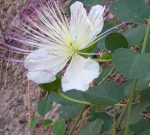 Also called flinders rose, this broad leaf evergreen creeping shrub is native to arid and semi arid regions of the Mediterranean, East Africa, Madagascar, parts of Asia, Himalayas, the Pacific Islands, Indomalaya, and Australia where it grows on lean, dry, rocky soils in full sun. The plants grow 2-5′ tall and 3-8′ feet wide. The round to ovoid, thick leaves are dark green, up up to 2″ long and have sharp hooked spines at the base of the petioles. The fragrant white flowers are borne on long pedicils and are 2-3″ across. They have long purple stamens and only last a single day but are produced over a long bloom time from spring to autumn. The fruits that follow are called caperberries. The condiment that we know as capers are the flower buds which are pickled or salted, but the caperberries and are also preserved and used in cooking, although they are considered less tasty. Photo Credit Wikimedia Commons
Also called flinders rose, this broad leaf evergreen creeping shrub is native to arid and semi arid regions of the Mediterranean, East Africa, Madagascar, parts of Asia, Himalayas, the Pacific Islands, Indomalaya, and Australia where it grows on lean, dry, rocky soils in full sun. The plants grow 2-5′ tall and 3-8′ feet wide. The round to ovoid, thick leaves are dark green, up up to 2″ long and have sharp hooked spines at the base of the petioles. The fragrant white flowers are borne on long pedicils and are 2-3″ across. They have long purple stamens and only last a single day but are produced over a long bloom time from spring to autumn. The fruits that follow are called caperberries. The condiment that we know as capers are the flower buds which are pickled or salted, but the caperberries and are also preserved and used in cooking, although they are considered less tasty. Photo Credit Wikimedia Commons
There is only one mention of the caper and it is in the Old Testement. Translator differ on the translations of the Hebrew word אביונה in the passage. Some scholars translate it literally as caperberry which was believed to stimulate appetite and lust while other translated it metaphorically as desire. At least three different basic translations result.
Ecclesiastes 12.5 The infirmaties of old age are described to remind young people to honor God while the body is strong and the spirit active.
NAS
“Furthermore, men are afraid of a high place and of terrors on the road; the almond tree blossoms, the grasshopper drags himself along, and the caperberry is ineffective. For man goes to his eternal home while mourners go about in the street.”
NIV
“ when people are afraid of heights and of dangers in the streets; when the almond tree blossoms and the grasshopper drags itself along and desire no longer is stirred. Then people go to their eternal home and mourners go about the streets.”
NCV
“You will fear high places and will be afraid to go for a walk. Your hair will become white like the flowers on an almond tree. You will limp along like a grasshopper when you walk. Your appetite will be gone. Then you will go to your everlasting home, and people will go to your funeral.”
The genus name, Capperis, from the Latin word caper meaning billy-goat and refers to the goat like flavor. The specific epithet, spinosa, is the Latin word for spines the structure that distinguishes this species from others.